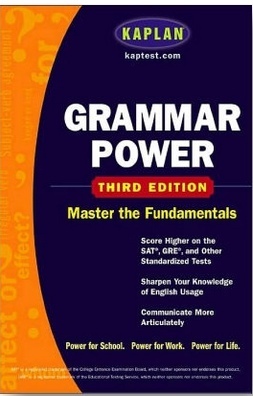Grammar Power

The first edition of GRAMMAR POWER was published in 1997. A second and third edition have appeared since then (the content remains the same).
CHAPTER 1: A LIFE SENTENCE
Read aloud the following group of words:
he is a man who cares
Perhaps you read it this way:
He is a man who cares.
But you might also have read it this way:
He is a man. Who cares?
Both versions are grammatically correct, both make sense, and both use the same words in the same order. However, they convey two very different messages. To communicate your thoughts in a clear, unambiguous way, you need to structure your words into sentences. Individual words are important, but meaning comes from sentences.
PRACTICALLY SPEAKING
You've been using sentences to communicate for most of your life, so obviously you know a lot about them even if you can't name or identify a single part of speech. That's okay. You're not reading about grammar so you can discuss participial phrases on your next date (at least, we sincerely hope not!). You're taking time out of your busy schedule to study grammar for only one reason: because it has practical value. The practical value of grammar resides in making sentences. That is its sole purpose. Communication -- both verbal and written -- is based on the sentence. That's why we're not going to spend the first 50 pages of this book teaching you the individual parts of speech. We're going to start right off with the real thing, what you use every day: the sentence. The place to practice swimming is in the water, not on the shore. So jump in; the water's fine. (You will need to learn a few terms as we go along, but we promise to keep them to a minimum.)
SENTENCE POWER
What is a sentence? The sentence is our basic unit of communication. From it we build everything from news broadcasts to college application essays; from e-mail messages to research papers; from corporate memos to true-crime novels; from "Dear John" letters to instructions for taking medication.
Plays and screenplays also grow from sentences (although, since they attempt to reproduce the spoken word, they do not always strive for grammatical correctness or completeness). Even poetry -- no matter how the lines appear on the printed page -- is carried, for the most part, on the backs of sentences.
What makes the sentence so powerful? A sentence is powerful because it is the expression of a complete and independent thought. A sentence, standing all by itself, makes sense. Every sentence you write is like a mini-drama or a very short story (the shortest story you can imagine). Someone (or something) does something (or is something). In other words: Something happens.
The boy smiles.
The girl swam.
We are leaving.
That movie was terrible.
They endured.
In and of themselves, these may not be the kind of stories for which Nobel Prizes in Literature are awarded (although the last -- and very famous -- sentence comes from The Sound and the Fury by William Faulkner, who actually did win the Nobel Prize in Literature in 1949), but they each fulfill the basic requirements: Something happens. Someone (or something) does something (or is something).